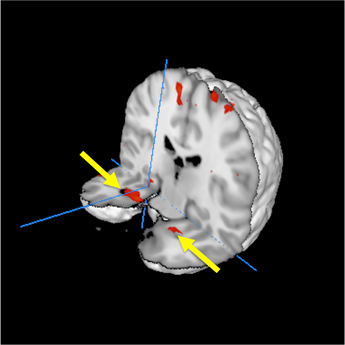Trauma Changes Your Brain’s Response To New Events, Increasing Activity In Emotional Memory Regions

Following a trauma, we see the world through different eyes.
While many people intuitively agree with this statement, a new MRI study offers some hard evidence in support of this belief. Remembering a near-plane crash they had experienced, a group of participants showed greater responses in brain regions involved in emotional memory — the amygdala, hippocampus, and midline frontal and posterior regions.
Interestingly, these same former passengers showed a remarkably similar pattern of brain activity when recalling the 9/11 terrorist attacks, which occurred shortly after the emergency plane landing, even though none of them had personal experience with the attacks.
“Mundane experiences tend to fade with the passage of time, but trauma leaves a lasting memory trace,” said Dr. Daniela Palombo, lead author of the study and a post-doctoral researcher at Boston University School of Medicine, in a press release.
Emergency Landing
Imagine the scene: Air Transat Flight 236, with a little more than 300 total passengers and crew aboard, began its scheduled flight from Toronto, Canada to Lisbon, Portugal on August 24, 2001. Suffering a fuel leak that caused a power outage, Captain Robert Piché and First Officer Dirk de Jager aimed the plane for a runway in the Azores. To lose altitude, Piche turned the plane 360 degrees and then aimed for the landing strip, which the plane hit twice before the crew could apply maximum braking pressure and bring the massive flying machine to a stop.
Miraculously, these two pilots saved everyone onboard, though some would suffer post-traumatic stress disorder in the years to come.
“This traumatic incident still haunts passengers regardless of whether they have PTSD or not,” Palombo said. “They remember the event as though it happened yesterday.”
In an earlier phase of the new study conducted three years after the traumatic incident, passengers completed a memory test (without brain scanning) to probe the quality of their memories of the flight. Passengers also recalled their memories of 9/11 and a neutral event.
All the passengers remembered a remarkable amount of detail for the Air Transat incident, the researchers noted. Those with PTSD, though, tended to veer off topic, recalling additional somewhat irrelevant information.
Nearly a decade following this first phase of the study, eight passengers agreed to return for a second phase. The group of eight former passengers ranged in age from their 30s to their 60s, including one married couple and some who had been diagnosed with PTSD.
Placed inside a functional MRI scanner, the eight passengers recalled details of their experience on AT Flight 236 while they watched a video recreation of the AT incident. Next, they reported their experience of the 9/11 attacks while watching footage, and finally, they recalled a third neutral autobiographical event.
As they recalled the near-plane crash, emotional memory regions of the brain lit up — the amygdala, hippocampus, and midline frontal and posterior regions.

Surprisingly, a similar pattern of activity occurred when they discussed the 9/11 terrorist attacks. Yet, the same activity did not occur when participants recalled a neutral event. These patterns were not evident in a comparison group of people who hadn't been involved in a near-plane crash, even when they recalled 9/11 while undergoing a brain scan.
Palombo believes the carryover effect may indicate the passengers' emergency landing scare changed the way their brains process new information. Following trauma, we may be more sensitive to painful life experiences, Palombo suggests, and so we view the world through new lenses.
Source: Palombo DJ, McKinnon MC, McIntosh AR, et al. The Neural Correlates of Memory for a Life-Threatening Event: An fMRI Study of Passengers From Flight AT236. Clinical Psychological Science. 2015.



























